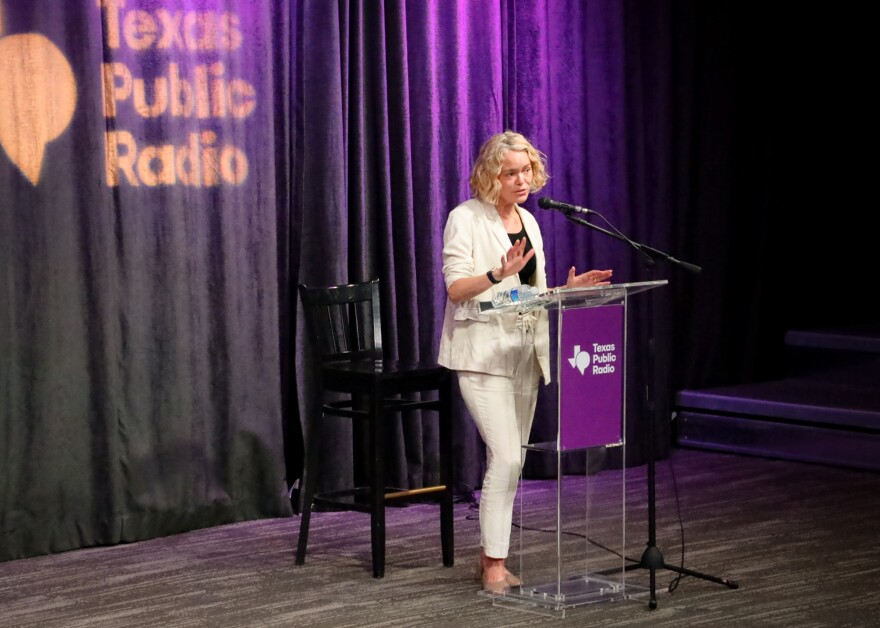Sign up for TPR Today, Texas Public Radio's newsletter that brings our top stories to your inbox each morning.
National Public Radio will cut its budget by about $8 million in order to provide that money to member stations most impacted by last week’s rescission of federal funding.
“Our board of directors at NPR made the decision that we would go ahead and reduce NPR's own operating budget by about $8 million in the year ahead in order for us to pass along that as fee relief to the most affected stations," said NPR's President and CEO Katherine Maher.
Public radio stations across the country lost a total of $350 million for each of the next two years when Congress narrowly voted to approve President Donald Trump’s clawback of more than $1 billion in funds for public broadcasting that were already approved for the next two fiscal years.
Maher told Texas Public Radio that the $8 million in relief for stations is just a first step for NPR.
“It's the short-term step for how we respond right now," Maher said. "We're going to use the rest of the year to plan for how we bridge what's to come in order to support and sustain the network for the future."
There are 79 public radio and 33 TV stations in 34 states and territories that are “vulnerable” to closing down with the loss of federal funding, according to a report released by Sen. Maria Cantwell of Washington.
Maher made her comments in an interview with Texas Public Radio's Dan Katz about the future of public media.
This conversation has been edited for length and clarity.
Dan Katz: Speaking as a lifelong public radio listener and as a journalist, my first question is: Will the elimination of federal funding change the standards that have made NPR what it is today?
Katherine Maher: Absolutely not. My feeling is that part of the reason that NPR is in the crosshairs is because it continues to adhere to high quality journalism in an uncompromising way. We believe in the integrity and importance of the independent press, and we have been unwilling to pull punches at times when we have come under pressure.
Now, having lost federal funding, I see no reason why we would back down from that position. In that stance, we will continue to be as independent and committed to getting the story wherever it is, whenever it is, whomever it involves, on behalf of the nation and on behalf of our stations.
Katz: You recently came to visit us here in San Antonio. Can you talk about that experience?
Maher: Yes, I loved coming to visit TPR. One of the first things that I did when I started at NPR was wanting to be out and meet our member stations, because everywhere we work is different. And the strength of our network is that there is local perspective everywhere you go, which means that we are able to be responsive to what matters to communities.
I was so warmly received at TPR by donors, supporters, listeners, the station itself. I walked out of TPR with — I don't know if it's a 10-gallon hat — but a pretty cool hat that I'm really proud to wear. I enjoyed the chance to meet with members of local civic leadership [and] the chance to get to know San Antonio a little better.
It is clear to me that there's a thriving thing happening at TPR, and that we at NPR are going to continue to do all we can to support the extraordinary work that you do, including the recent work around the Kerr County floods and response and recovery.
Katz: In Texas, we have a statewide collaboration called The Texas Newsroom. Is there something that the rest of the country can learn from us here in Texas?
Maher: I think so. My view is that The Texas Newsroom is a model for what we can do across the nation. It demonstrates the power of local news. It demonstrates the importance of regional news. What we have in common across parts of the country that share, whether it's in the case of Texas, a state border, or in the case of our Appalachian newsroom, it's been described as a state of mind — these are areas that people live and work and share things in common, and this allows us to make sure that we've got news that is relevant beyond just maybe your local town council, but not quite at the level of national news.
It allows us to surge resources when we need to in moments of crisis — as just happened with the recent flooding in Texas — I think that there's a lot that we can learn here. It allows us to be closer to the ground and to the communities that we report on, and we've seen that model now spread through the country. There's five additional newsrooms beyond Texas, and we have more coming online with the commitment to fully cover the entire nation with regional news in the years ahead.
Katz: Are there some new philanthropic opportunities out there to support public radio's mission?
Maher: I believe that there are opportunities for us to be speaking to donors that haven't historically supported public media. One of the big misconceptions, I think, with federal funding is that we were entirely supported by federal funds as a network, as individual stations, and that is simply not true. There are stations in rural parts of the country that receive maybe 50% of their funding from federal funds ... which means funding has to come elsewhere. Most of that comes from private donations.
This is a way of us being able to restart that conversation with philanthropy at the national level, at the regional level, at the local level, if you care about something in your community, media, radio, local reporting. ... [It's] a way to make sure that stays at the top of the agenda for that community.
It is a way to make sure that there is accountability about what is going on, whether we are talking about housing affordability or the local economy and jobs creation or education and public schools. This is a really important way to ensure that we are supporting strong communities, and so it's an opportunity for us to reengage in that conversation with both traditional and non-traditional donors as to why public media matters.
Katz: This is a challenging moment for public radio, especially the stations at risk of going dark or having very limited operations. But is there also opportunity in a moment like this?
Maher: We have colleagues across the country who work very hard, and their jobs are now in question. We have communities that are served across the nation, in rural communities in particular, where they may see a total loss of their station, of their services. We have tribal communities, places in coastal Alaska, places that serve indigenous language — like Yup'ik — they're going to lose funds, and I don't know what that outcome will be.
And also to your point about the opportunities for new funding, that is, we have a chance here to really rethink what the public radio network looks like for the next 50 years of service. And this fight has, if anything, I believe, brought public media closer together across the nation, and is a chance for us to really do that act of reimagining in order to think about not just what does radio need, but how do we continue to serve with local journalism and community support and engagement on the things that matter.
Katz: Do you have some more specifics that you can share about how NPR will help vulnerable stations survive?
Maher: Going into this vote, we knew that rescission was possible — not an outcome we were hoping for, certainly not an outcome we necessarily even thought would be definite — but we wanted to make sure we were planning in advance in order to have something ready to go if the vote didn't go our way.
And our board of directors at NPR made the decision that we would go ahead and reduce NPR's own operating budget by about $8 million in the year ahead in order for us to pass along that as fee relief to the most affected stations. That is just the first step. It's the short-term step for how we respond. Right now, we're going to use the rest of the year to plan for how we bridge what's to come in order to support and sustain the network for the future.
But I'm proud that as an organization, we prioritize and are prioritizing the health of our network, universal service to all Americans, the ability for us to continue to support local journalism by recognizing that is what is important in this moment.



